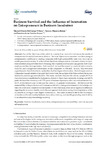Mostrar o rexistro simple do ítem
Business Survival and the Influence of Innovation on Entrepreneurs in Business Incubators
| dc.contributor.author | Campo Villares, Manuel Octavio del | |
| dc.contributor.author | Miguéns-Refojo, Vanesa | |
| dc.contributor.author | Ferreiro Seoane, Francisco Jesús | |
| dc.date.accessioned | 2020-09-17T07:57:34Z | |
| dc.date.available | 2020-09-17T07:57:34Z | |
| dc.date.issued | 2020 | |
| dc.identifier.citation | Campo Villares, M.O. del, Miguéns-Refojo, V. y Ferreiro-Seoane, F.J. (2020). Business Survival and the Influence of Innovation on Entrepreneurs in Business Incubators. Sustainability, 12 (15), pp 1-17. https://doi.org/10.3390/su12156197 | es_ES |
| dc.identifier.issn | 2071-1050 | |
| dc.identifier.uri | http://hdl.handle.net/2183/26202 | |
| dc.description.abstract | [Abstract]: One of the objectives of this article is to study how innovation influences the results of entrepreneurs located in business incubators. The other objective is to examine how the training of entrepreneurs contributes to creating companies with high sustainability rates over time that are wealth generators in society. To achieve these objectives, entrepreneurs in business incubators in Spain were identified along with their level of training, their experience in business management, how much employment they have generated, their survival rate and the annual accounts (where economic, financial, and management information on the companies is collected). In turn, they were sent a questionnaire that allowed us to classify them by their degree of innovation. The techniques used are independent sample statistics that apply the Levene’s test, the analysis of the balance sheet, the income statements, and management indicators. This study concludes that, from the selected sample, 83.3% of the entrepreneurs established in business incubators in Spain have university training, and 64.2% prefer the branches of science, with 7.75 years of business experience, which favors business survival (100% in the seventh year of life) and the creation of qualified employment. All this favors the sustainability of the productive and business model which, being more intensive in knowledge and R&D, becomes more competitive in the market. On the other hand, there are no significant differences regarding the economic results, nor in the management indicators among the entrepreneurs of the incubators according to their degree of innovation. The value of research lies in the importance of studies on the relationship between innovation, training, and wealth-generating sustainability in incubators in today’s knowledge economy. | es_ES |
| dc.language.iso | eng | es_ES |
| dc.relation.uri | https://doi.org/10.3390/su12156197 | es_ES |
| dc.rights | Atribución-NoComercial-SinDerivadas 4.0 España | es_ES |
| dc.rights.uri | http://creativecommons.org/licenses/by-nc-nd/4.0/es/ | * |
| dc.subject | Business incubators | es_ES |
| dc.subject | Innovation | es_ES |
| dc.subject | Entrepreneurship | es_ES |
| dc.subject | Sustainability | es_ES |
| dc.subject | Survival analysis | es_ES |
| dc.subject | Self-employment | es_ES |
| dc.title | Business Survival and the Influence of Innovation on Entrepreneurs in Business Incubators | es_ES |
| dc.type | info:eu-repo/semantics/article | es_ES |
| dc.rights.access | info:eu-repo/semantics/openAccess | es_ES |
| UDC.journalTitle | Sustainibility | es_ES |
| UDC.volume | 12 | es_ES |
| UDC.issue | 15 (6197) | es_ES |
| UDC.startPage | 1 | es_ES |
| UDC.endPage | 17 | es_ES |






